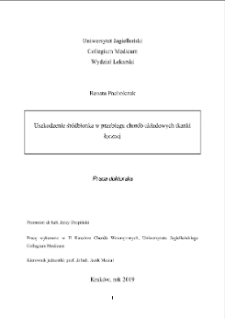Obiekt
Tytuł: Staphylococcus aureus infections among Polish patients of selected hospital and care institutions: epidemiology and characteristics of microorganisms
Abstrakt:
Hospital infections are an important cause of morbidity and mortality worldwide, especially if the etiological factor is drug-resistant microorganisms, and concems the population of the most vulnerable patients. The conducted research allowed to describe in detail the epidemiology of infections with S.aureus aetiology m southem Poland. Epidemiological analysis was carried out in vanous analytical areas, such as: type of care, population, clinical form of infection. Multicentre studies on nosocomial infections covered orthopaedic patients, newboms and long-term care residents. The PFGE typing was subjected to strains from neonatal and resident infections. Strains isolated from newboms were typed by the spa-typing method and the SCCmec chromosomal cassette was determined. As a result of the research it was found: (1) significantly higher incidence rate after knee prosthesis, while epidemiology and microbiology after the implementation of infections surveillance in hip arthroplasty did not differ from that expected; (2) in neonatology, horizontal transmission of MRSA strains; high consumption of glycopeptides in the treatment of MSSA (3) The presence of MRSA in locals is significantly associated with limited mobility: the Barthel scales can be used as a determinant of MRSA colonization in targeted screening (4) strong interpenetration of the community and ; hospital environment, which proves that drug-resistant strains are not the domain of institutional care. Among the tested neonatal isolates, the largest group was the spa tO 15 and at the same time SCCmeclV.
Miejsce wydania:
Stopień studiów:
Dyscyplina:
Instytucja nadająca tytuł:
Promotor:
Wójkowska-Mach, Jadwiga ; Chmielarczyk, Agnieszka
Data wydania:
Identyfikator:
Sygnatura:
Język:
Prawa dostępu:
Kolekcje, do których przypisany jest obiekt:
Data ostatniej modyfikacji:
14 mar 2023
Data dodania obiektu:
30 cze 2020
Liczba wyświetleń treści obiektu:
23
Liczba wyświetleń treści obiektu w formacie PDF
0
Wszystkie dostępne wersje tego obiektu:
http://dl.cm-uj.krakow.pl:8080/publication/4357
Wyświetl opis w formacie RDF:
Wyświetl opis w formacie OAI-PMH:
| Nazwa wydania | Data |
|---|---|
| ZB-130754 | 14 mar 2023 |
Obiekty
Podobne
Romaniszyn, Dorota
Pomorska-Wesołowska, Monika
Domagała, Angelika
Grela, Magdalena
Hubalewska-Mazgaj, Magdalena
Majka, Grzegorz
Krakowski, Radosław
Wałaszek, Michał

